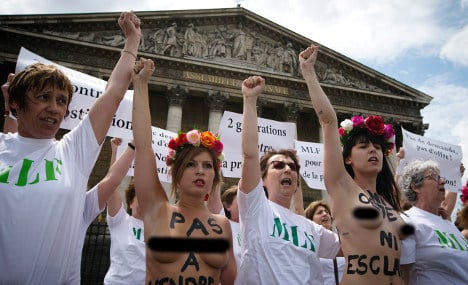1. Fining clients
The stand-out measure from the bill and the one that has caused the most controversy is the law that will see clients fined if they are caught paying for sex.
By making the clients rather than the prostitutes the guilty party the reform will “turn the current law on its head,” according to French Socialist MP Maud Olivier, who has been the driving force behind the change.
Under the plan, clients will be fined up to €1,500 and up to €3,750 for repeat offenders.

It brings France into line with Sweden, which has had the same law in place since 1999. Some claim it has helped cut prostitution by half in the Nordic country, whereas critics claim it has simply pushed it out of sight of authorities, which is also the fear among sex workers unions in France.
A period of grace will also be introduced so clients will not immediately be fined, but they will be expected to take heed of the new law.
The measure has not only been criticised by prostitutes, who fear they will become victim to yet more “violence, stigmatization and poverty” but also by police, charities and rights groups, who doubt it will have the desired impact in reducing prostitution.
2. Awareness classes
One of the new measures that has caught the eye is that those people caught paying for sex, will not just face steep fines, but will also be forced to attend classes highlighting the harms of prostitution and how sex workers are often victims of trafficking and forced into working on the streets.
The aim is to make the clients more aware in the hope it dissuades them from paying for sex.
3. Repeal of the ban on passive soliciting
The second measure in the bill that aims at “shifting the balance of power” is the repeal of the law that made passive soliciting illegal.
This law had been brought in back in 2003 under ex-President Nicolas Sarkozy which saw prostitutes being fined if guilty of soliciting for sex. This had the impact of pushing prostitutes into out of town areas and forced them to dress a little more discreetly to avoid detection.

Repealing this law is aimed at reinforcing the notion that sex workers are victims and not criminals. It also allows prostitutes to act as witnesses in certain crimes without fear of being charged with an offense.
This measure has been largely welcomed by all sides.
4. Help offered
The new bill will make it a right for all victims of prostitution to be able to benefit from protection and assistance.
A programme will be set up to help prostitutes get out of the profession and €4.8 million will put set aside by the state to help prevent prostitution and offer social and professional support for sex workers.
The move, although welcomed, has also been criticised by sex worker unions who believe €4.8million will be stretched too far and in the end mean the country’s 40,000 prostitutes will not receive any effective life changing aid.
5. Residence permits for foreigners

France want to tackle the issue of the number of foreign prostitutes (Up to 80 percent of the 40,000 estimated sex workers) working in the country – most of whom are either from eastern Europe or Africa.
In a bid to help them escape the trade some will offered six month residency permits if they accept to take “the exit programme”.
Strass, the main sex workers union in France has blasted the measure as “blackmail”.
6.. New body created in local authorities
These new bodies that will come under the authority of the council in each of France’s départements will be tasked with coordinating action to help prostitutes and to tackle trafficking. Associations backing the new believe the creation of these new bodies will help create a “territorial mesh” that will help in the application of the new law.



 Please whitelist us to continue reading.
Please whitelist us to continue reading.
Member comments